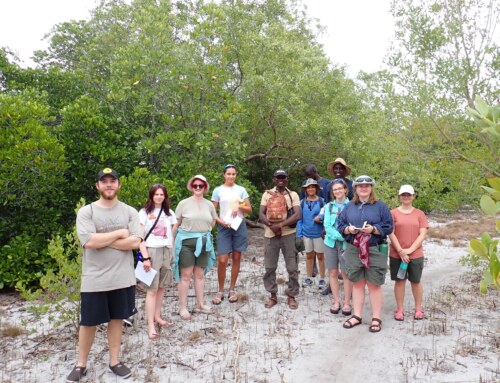2021 was an exciting year for sustainability at TBI. We made great strides towards improving our environmental sustainability by increasing investments in clean energy. Over all, we installed over 50 kWp of solar panels, which can generate a cumulative 330 kW of power daily and we installed over 100 kWh of battery storage. This includes a replacement power installation in Turkwel that includes our first lithium ion batteries, a replacement power installation in Ileret to serve the camp, solar pumping at the Ileret borehole and a new solar powered reverse osmosis machine in Ileret.

New solar panel installation at TBI Turkwel
As a result, both field stations have reliable 24 hour power, we have greatly increased our capacity to pump and treat water, and we will save over 16,000 kg of CO2 emissions on an annual basis. These investments will also result in reduced operating costs due to the reduced consumption of fossil fuels.

TBI Turkwel’s new power management system, which includes 3 BYD Lithium Ion batteries
The water infrastructure investments were funded by the Water and Energy for Food Program project being conducted at TBI Ileret. The aims of this project are to demonstrate and disseminate the use of solar reverse osmosis in hydroponic farming, you can read more here.
Previously TBI Ileret has relied upon a diesel powered reverse osmosis plant for it’s drinking water needs, this machine was operated for more than 20 years, demonstrating our capacity for excellent maintenance in Turkana’s harsh conditions. To produce water in this way, 1 litre of diesel was consumed for every 165 litres of fresh water produced. Now using our reverse osmosis machine from Mascara, we can produce 20,000 litres of fresh water per day using solar power alone. An additional important development is the inclusion of automation in the technologies installed, saving staff time and ensuring optimized operation.

The TBI Ileret team getting training on the new automated Reverse Osmosis machine
The broader impact of these technologies can not be understated, large parts of northern Kenya are already water stressed, and this situation will be exacerbated across the region due to increasing variability driven by climate change. Demonstrating these technologies addresses TBI’s key operational needs, while also sparking new research questions and developing solutions that address local challenges.

Solar panel installation at the TBI Ileret borehole





